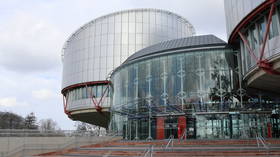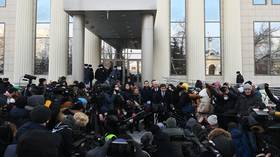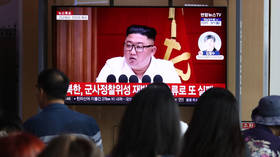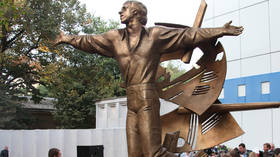ECHR urges Russia to suspend dissolution of NGO Memorial

The European Court of Human Rights (ECHR) has called on Russia not to implement the court-ordered dissolution of the non-governmental organization (NGO) Memorial, citing a rule designed to prevent “irreparable harm.”
The ECHR was responding to a decision taken by the Moscow City Court, on Wednesday which sided with the prosecution and ruled in favor of the dissolution of the group.
“The Court has decided to indicate to the Government of Russia, under Rule 39,… that, in the interests of the parties … the enforcement of the decisions to dissolve the applicant organizations should be suspended for a period that would be necessary for the Court to consider the application,” the ECHR said in a statement on Wednesday, referring to a motion filed by an array of Russian organizations back in 2013.
According to an ECHR letter circulated by the NGO, on Wednesday, the court is referring to application number 9988/13. The document challenges Russia’s ‘foreign agents’ law, which came into effect in late 2012. While the complaint was filed nearly a decade ago, the ECHR has still not ruled on it, and it remains unclear when that might happen.
Rule 39, cited by the ECHR, refers to the interim measures that can be communicated by the court to state parties of the European Convention on Human Rights in the case of “an imminent risk of irreparable harm.” The rule is rarely used in respect to organizations, and is more commonly enforced to demand a stay of extradition or expulsion proceedings on individuals facing persecution in their homeland.
In 2015, the Russian Constitutional Court ruled that Russia may refuse to follow ECHR decisions if they violate the country’s principal law, thus establishing the precedence of the Russian constitution over international treaties and conventions.
Memorial was accused of violating the foreign agents law, with officials pointing out that the organization has been repeatedly fined over its failure to properly mark its materials as having been created by a foreign agent. It also claimed the NGO had broken away from its roots, arguing that, although it had been created “to perpetuate historical memory,” it had shifted its focus to “distorting” history. The prosecution has alleged that the group “creates a false image of the USSR as a terrorist state,” and “attempts to whitewash and rehabilitate Nazi war criminals who have the blood of Soviet citizens on their hands … probably because someone is paying for this.”
The NGO has 30 days to appeal the dissolution order, with the group’s legal team already having signaled that it plans to do so. The Kremlin has distanced itself from the case, with Kremlin spokesman Dmitry Peskov declining to comment on the court order on Wednesday.
“That’s a court ruling. We never comment on any court rulings,” Peskov said.













